Argan oil is an all-natural product of the argan tree native to Morocco that can be used as a source of healthy fats and, more commonly, as a moisturizing agent.
It’s currently one of the hottest rejuvenating skin, nail, and hair oils, and argan oil found in everything from shampoo to facial moisturizers.
But argan oil can also be used in its pure form, and might even be more effective this way. Our research team has ranked the ten best argan oil products in terms of quality and purity. Read on to see our rankings.
Research
Rankings
1. Eve Hansen Argan Oil
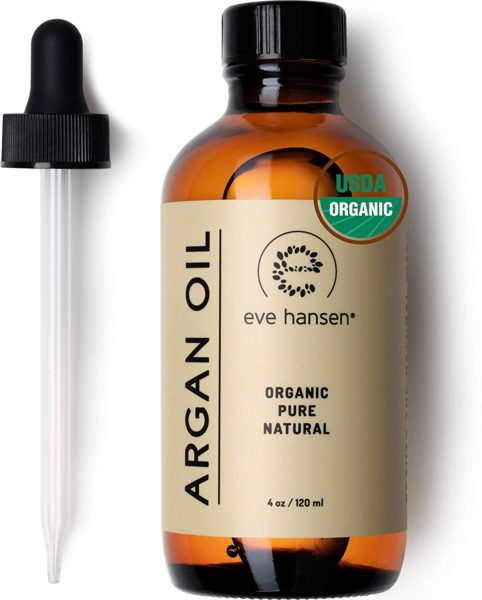
Eve Hansen makes some of the top all-natural cosmetic ingredients, and their argan oil is no exception. It’s certified organic and comes in an amber glass container to protect it from light-based oxidation.
Users love it both on its own and combined with other natural rejuvenating products like shea butter or coconut oil. Thanks to its purity and ease of use, Eve Hansen Organic Argan Oil is our top choice.
2. ArtNaturals Argan Oil
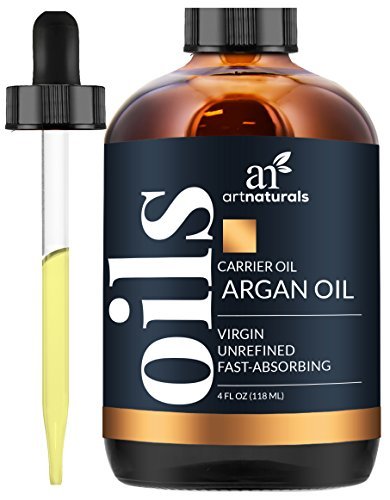
ArtNaturals Argan Oil makes what they call a “therapeutic grade” argan oil. It’s designed either for cosmetic use or for health supplemental use—you can consume this without worrying about any impurities that might be toxic or harmful.
The eyedropper lid is less convenient for large-scale cosmetic uses, but makes it easier to estimate dosing if you are taking this as a supplement.
3. VoilaVe Organics Argan Oil
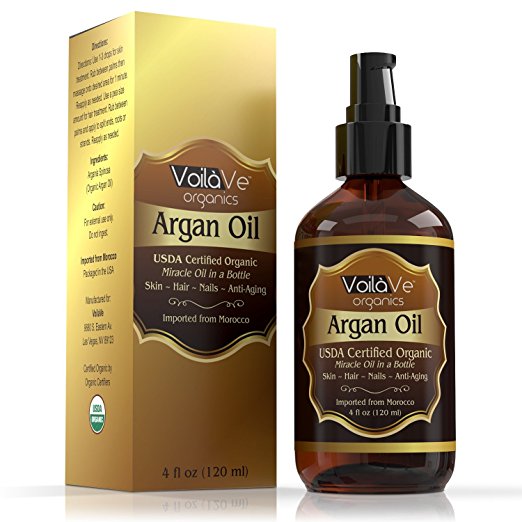
VoilaVe Organics Argan Oil makes a certified organic argan oil that works great for imparting shine and moisture into long hair.
It’s increasingly becoming one of the top products on the market when it comes to argan oils directed specifically at cosmetic uses, and for good reason.
4. US Organic Moroccan Argan Oil
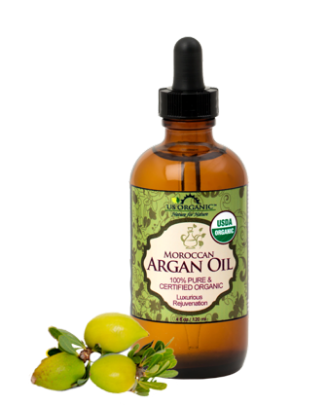
US Organic Moroccan Argan Oil is a pretty solid argan oil that has the added benefit of being certified organic. It’s particularly effective at moisturizing long hair, but it works well on skin too.
5. Pura D’or Organic Argan Oil
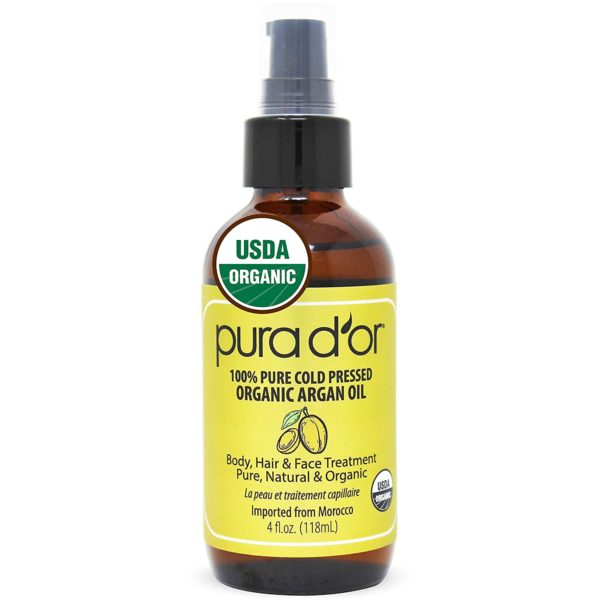
Pura D’or Organic Argan Oil comes in a bottle with a pump top, which makes application onto long hair or large swaths of skin a breeze. It has a faint nutty scent, which is a byproduct of its pure and unprocessed form.
6. Kate Blanc Argan Oil
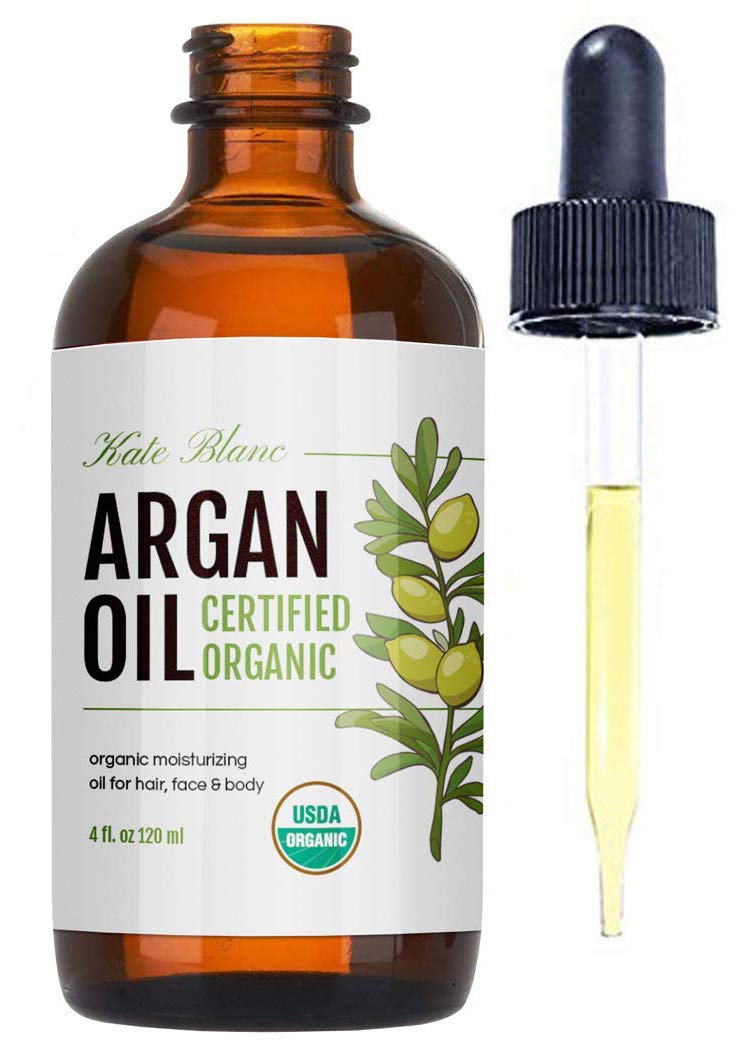
Kate Blanc makes a certified organic argan oil. It comes in a four ounce bottle with an eyedropper lid, making it ideal for treating your face, hair, or nails.
It’s been subject to some processing to remove some of the nutty, oily scent from the oil, so while this makes Kate Blanc Argan Oil more accessible to people who don’t want the scent in their hair, it will also drive away purists who want an argan oil with minimal processing.
7. Cliganic Argan Oil
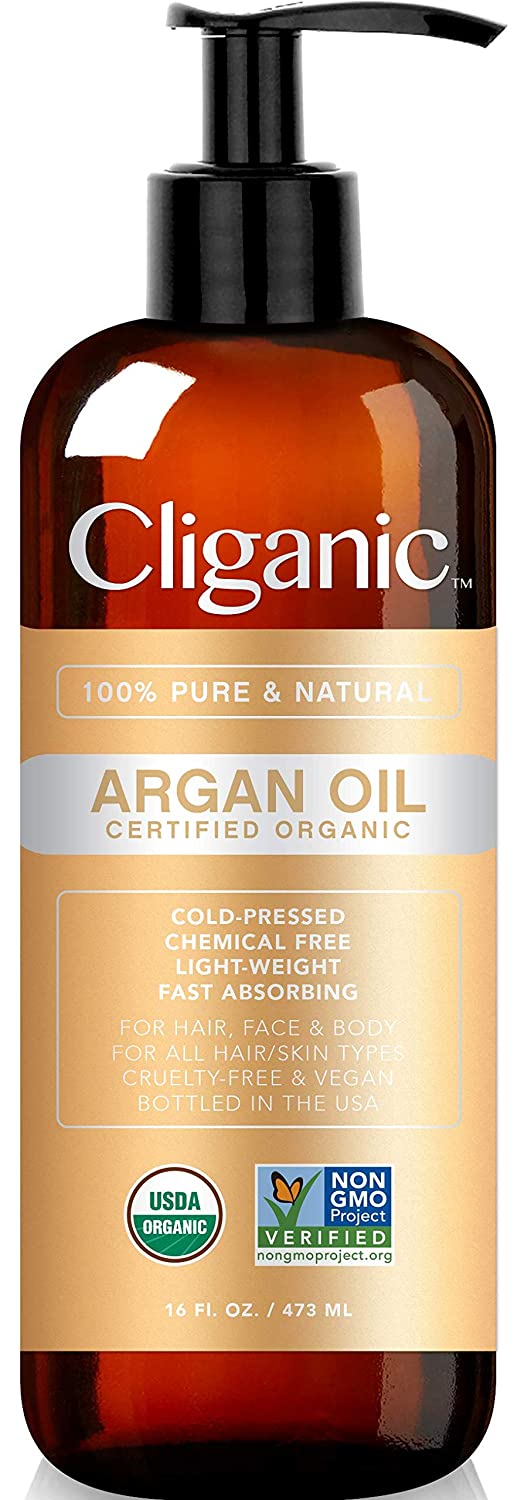
Cliganic Argan Oil makes a bulk-sized argan oil product that’s organic and has a convenient pump top dispenser on top. If you know you’ll be going through a lot of argan oil, it’s a solid choice.
8. Aria Starr Beauty Argan Oil
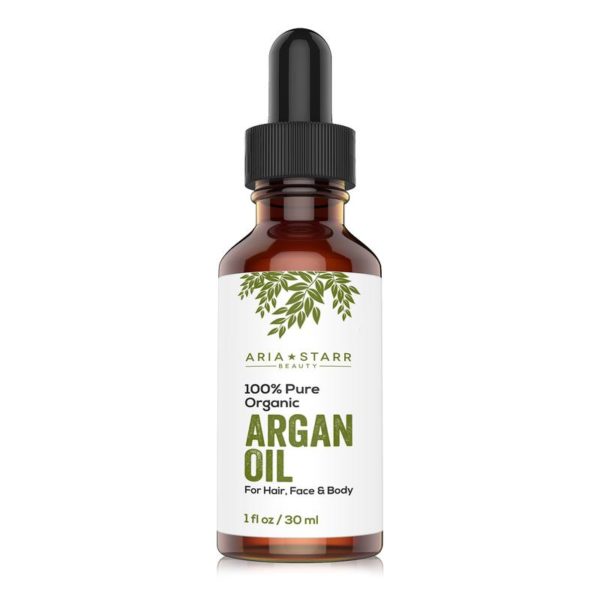
Aria Starr Beauty Argan Oil comes in a small, portable one ounce vial with an eyedropper lid. Unlike some other competitors, it is not certified organic, and regular users may go through the small bottle fairly quickly—especially if you have long hair or use it on a large area of skin.
While this might not be the best option for regular use, it’s a good choice for travelling or for the occasional user.
9. One N’ Only Argan Oil Spray

One of the mildly frustrating things about applying argan oil to your hair is that it’s too thick to spray in. One N’ Only has a product that solves this problem, though at the cost of purity.
One N’ Only Argan Oil uses organic solvents to dilute the argan oil enough so it can be sprayed out of a nozzle, and users find it incredibly convenient for easy application.
However, the solvents themselves might dry out your hair, counteracting the benefits of the argan oil. You’ll have to weigh the convenience of the spray top against the potential downsides of the extra solvents included in this product.
10. Majestic Pure Moroccan Argan Oil
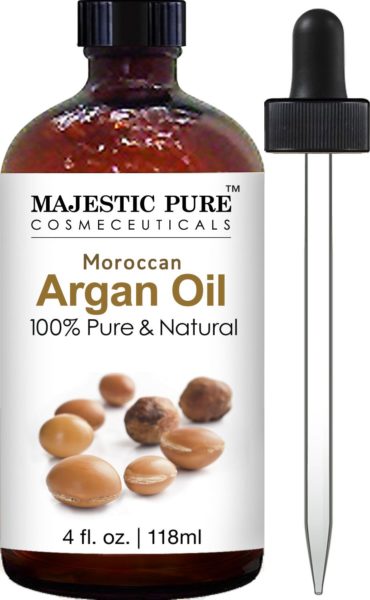
This argan oil from Majestic Pure is a high quality, authentic cold pressed Moroccan oil with no additives.
Delivered in a dark amber glass bottle with a dropper for ease of use. Pure and organic with great moisturizing properties, this oil is a good choice for any user.
Category winners
Best argan oil overall: Eve Hansen Argan Oil
Eve Hansen goes the extra mile to deliver super-pure and unrefined argan oil, and this aggressive focus on quality helps it garner our top overall spot. It’s a high-quality, versatile, and pure argan oil for any application.
Best argan oil for skin: VoilaVe Organics Argan Oil
VoilaVe is great for skin thanks to its easy to use pump top, plus its ultraviolet-resistant amber glass container that keeps the antioxidant content of argan oil as fresh as possible.
Best argan oil for hair: Eve Hansen Argan Oil
Since Eve Hansen’s priority is purity, it should be no surprise that this organically-certified argan oil is our recommendation for rejuvenating dry and lackluster hair.
Best argan oil for your face: VoilaVe Organics Argan Oil
VoilaVe is our recommendation both for your face and for skin generally—its pump top makes it super easy to apply, and helps keep bacteria out of the container as well. It’s the perfect addition to your skincare routine.
Best argan oil for beards: ArtNaturals Argan Oil
Don’t think that argan oil is just for women. It’s one of the best compounds to use as a beard oil, thanks to its powerful hydrating and antioxidant properties. For men who want to improve the quality of their beard, ArtNaturals Argan Oil is the way to go thanks to its large size and focus on purity.
Best argan oil for nails: Kate Blanc Argan Oil
For strengthening brittle or fragile nails, Kate Blanc Argan Oil is our recommendation because of its purity and ease of application. It’s cold-pressed to retain a high content of moisturizing oils, which can help reinforce nail strength.
Who Should Buy Argan Oil?
Argan oil is great for all individuals looking to improve their hair health and skin health. It is also great to use in baking and is a healthy food additive that can improve cholesterol profiles and reduce overall systemic inflammation.
Argan oil can be safe to use during pregnancy but should be monitored in case of any adverse reactions.
How We Ranked
The first thing we looked at was the purity. One N’ Only Argan Oil made our list for providing an easy to spray argan oil. While convent, it ranks second last for including various organic solvents, which not only dilute the purity of the argan oil but also combat its moisturizing effects. Aria Starr Beauty provides a better argan oil, but it isn’t certified organic. Furthermore, it comes in a very small size, which can be quite inconvenient if you use a lot.
Kate Blanc provides a certified organic argan oil but is significantly more processed to eliminate the nutty scent, which is why it ranked in the bottom half. US Organic Moroccan andVoilaVe Organics ranked in our top 5 for providing very minimalistic organic argan oils. ArtNaturals is therapeutic grade argan oil, making it one of the purest products on the market. Its eyedropper lid is inconvenient for people who use argan oil regularly, which is why it ranked where it did.
Lastly, we looked at added ingredients and bottling. Eve Hansen provided a certified organic argan oil, combined with other natural complementary products including coconut oil. It also comes in an amber glass bottle to protect it from damaging light.
Benefits
Argan oil is an excellent moisturizer. Research into the uses of argan oil for moisturizing the skin have sometimes focused on post-menopausal women, because the hormonal changes that happen during menopause predispose many women to developing dry skin.
One study that used post-menopausal women to study the moisturizing effects of argan oil was published in 2013 in the journal Skin Research Technology (1).
In this study, the authors had the women apply ten drops of argan oil to one of their forearms every night before bed. The women continued this protocol for two months, after which the researchers assessed the women’s transdermal water loss, a measure of how much water is contained in the skin.
The results showed that the women experienced a significant improvement in skin moisture content. Another study published in 2014 by researchers in Morocco confirmed these results, but their study looked at both topical application of argan oil and consumption (2).
Another group of post-menopausal women were assigned to use either argan oil or olive oil on a regular basis. However, some of the women in each group consumed their assigned oil orally, and some of them applied it topically to their skin.
Again, after 60 days, the researchers studied the water content of the women’s skin and found that the argan oil was superior to the olive oil when it came to skin moisture. Interestingly, the women who took argan oil orally also seemed to experience skin moisture benefits.
Argan oil can also be used to moisturize and rejuvenate hair and nails. One of the most popular uses of argan oil is for hair and nails, which (believe it or not) are made out of the same protein.
A 2011 article in the European Journal of Lipid Science and Technology detailed the benefits of argan oil on hair and nails (3).
According to the author, the compounds in argan oil have unique rejuvenating properties for the proteins in hair and nails (as well as skin). For this reason, you’ll find argan oil in some of the best beard oils.
Consuming argan oil orally could help prevent diabetes and lower your cholesterol levels. Argan oil is currently popular thanks to its cosmetic uses, but in Morocco, it is also used as a food.
Taking argan oil orally has been associated with a number of health benefits, as it appears to be a good source of healthy fats. One study, for example, published in the journal Phytotherapy Research in 2011, studied whether argan oil could exert an anti-diabetes effect in an animal model (4).
The study involved administering argan oil or a control oil to a group of rats for seven days, then exposing them to a chemical agent that induces diabetes.
The researchers found that the rats fed argan oil were resistant to the diabetes inducing effects of the chemical, which provides some initial evidence that argan oil could be useful for treating or preventing metabolic disease.
While it’s hard to extend such research up to humans, some experiments in people do attest to other health benefits of consuming argan oil.
One study was published in the Annals of Nutrition & Metabolism in 2005 by a team of researchers in France (5). This study used sixty volunteers who first consumed a controlled amount of butter (to establish a baseline level of blood lipids), then took either 25 grams per day of virgin argan oil, or 25 grams per day of olive oil.
The researchers monitored blood lipid levels and cholesterol in all of the study subjects for the next three weeks.
The results showed that, compared to the group that consumed olive oil, the argan oil group saw a decrease in their cholesterol levels as well as a decrease in their blood lipid levels.
It’s important to emphasize that the control group was consuming a healthy oil too, so it suggests that argan oil could be particularly useful supplement for cardiovascular health, even compared to other healthy oils.
Side effects
Because it’s naturally derived directly from the kernels of the argan tree, argan oil has a very low potential for any adverse effects.
Like any plant-derived compound, there is some risk of an allergic reaction. A number of case studies in the scientific and medical literature have detailed these.
One such report was published in The European Journal of Allergy and Clinical Immunology, and describes a case of anaphylactic shock precipitated by argan oil (6).
A case series published by doctors at the Dermatology Clinic at the University of Bari in Italy described four different people who developed a skin rash and inflammation after using argan oil on their skin (7).
Such events are rare, and these kind of adverse risks are shared across pretty much any type of plant extract, from well-known allergies to things like peanut or almond butter to more obscure adverse reactions reported in milder foods—one study even describes a case of contact dermatitis to olive oil (8).
Recommended use
For moisturizing and rejuvenating skin, you can apply a small amount of argan oil (just enough to cover the area you’re treating) twice per day.
Pump-style containers can make it quick and easy to dispense a small amount of argan oil and lightly massage it onto your skin.
Hair may need to be treated less often, and treating hair is often easier with an eyedropper style bottle. The amount of argan oil you’ll need to apply is obviously going to depend strongly on how much hair you have.
Make sure you run your hands through your hair several times after applying argan oil, as you want it to be evenly and thinly distributed, otherwise your hair will look oily and uneven. If you are looking for better scalp health, massage a bit of argan oil directly into your scalp, too.
For use as a dietary supplement, argan oil is usually taken in doses of about 25 grams per day in clinical research. You can mix it into a salad, smoothie, or even drink it raw if you prefer.
FAQ
Is argan oil good for your skin? When it comes to the skin, argan oil is incredibly effective at moisturizing and hydrating the skin. You can even use argan oil as an at-home treatment method for conditions like eczema and acne. It’s also been shown to be useful in providing a more youthful skin appearance and healing surface level wounds.
Is argan oil good for your hair? When used on the hair, argan oil is recognized for its ability to provide a shinier appearance while also reducing flyaways and dry, frizzy hair.
Can you drink argan oil? Though it’s not the most common use of argan oil in America, argan oil can yield remarkable benefits when it’s consumed.
With impressive levels of vitamin E and healthy fats, argan oil can improve heart health, prevent conditions like diabetes, and even improve the skin, eyes, and hair.
Is it safe to put argan oil on your face? Yes, argan oil is gentle on your skin, making it safe to use on your face. Argan oil can be extremely effective at reducing the amount of sebum in the pores on your face, and help treat acne and clogged pores. Argan oil is also very good for smoothing out your complexion and limiting dry patches.
Can I use argan oil every day? No matter how you’re using argan oil, it’s completely safe to use daily. Some experts even suggest using argan oil twice a day to help improve the speed of results. However, if you’re planning to add argan oil to your daily beauty routine, you should start with once a day and see how your hair, skin, and body tolerate the oil.
Is argan oil anti-aging? Argan oil has a remarkable ability to provide anti-aging effects in consumers. There is evidence that argan oil can improve skin elasticity, improve hydration, and even reduce stretch marks in the skin. In a study conducted in 2015, scientists were looking to determine the dermatological effects of consuming argan oil. In the treatment group receiving daily doses of argan oil, researchers found that argan oil led to a significant increase in skin elasticity and produced incredible anti-aging effects (9).
Another study conducted in 2014 focused a bit more on how argan oil can impact the hydration of the skin. Researchers determined that using argan oil can reduce the loss of water from within the skin, by increasing the water content of the epidermal layer (10).
Can you put argan oil on wet or dry hair? Argan oil can be useful on both wet and dry hair. By applying argan oil to damp or wet hair, you can target frizzy hair and make it look smoother once it dries. By applying argan oil to dry hair, you can more effectively limit flyaways and make your hair look smoother and shinier. There’s also evidence that using argan oil products on the ends of your hair can help prevent the development or worsening of split ends.
Can too much argan oil damage hair? Too much argan oil can cause minor hair damage, but nothing significant. The worst side effect you’ll have to worry about is your hair drying out. Another concern would be your hair looking too shiny or even greasy. With argan oil, less is more.
Does argan oil cause cancer? No, argan oil can slow the development of some cancers and even help prevent others. This is thought to be because of the high content of antioxidants present in argan oil. When antioxidants attack the free radicals in your body, it limits the development and spread of certain diseases. There have also been studies to suggest that using argan oil on the skin can prevent skin cancer altogether.
Does argan oil cause GI issues? Yes, argan oil can cause gastrointestinal effects like diarrhea, constipation, nausea, and flatulence. If you’re using the argan oil directly on your skin and hair, argan oil may cause itchiness, rashes, and even breakouts. Skin issues can imply that you have an allergy to argan oil, so keep an eye on any skin conditions that may develop after using the product.
Is argan oil shampoo suitable for dogs? While most argan oil products are designed for humans, some products can be used on a dog’s coat.
If your dog has a dry coat or dry skin, argan oil can be beneficial in moisturizing and hydrating the skin. In the same realm, argan oil can also improve the appearance of the coat and make your dog’s hair shinier and look less unkempt.
Where can I buy argan oil? Argan oil beauty products can be found at nearly every health and beauty store due to their popularity. Online retailers like Amazon are a great option as well.
What does argan oil smell like? Pure argan oil is usually described as smelling similar to olive oil, but can also be described as nutty. However, if you’re using hair and skin products infused with argan oil, you’ll likely never smell the argan oil because it’s combined with several other scents and products. If you’re consuming pure argan oil as an addition to your favorite dish, you might notice that the oil tastes somewhat nutty or toasted.
What is argan oil? Argan oil is an oil product that comes directly from the kernels of the Argan tree, which is native to Morocco. The physical composition of argan oil is mostly fatty acids, with a breakdown of about 20% saturated fat and 80% monounsaturated fat. It’s capable of treating major and minor skin conditions, preventing the development of chronic diseases like cancer and diabetes, makes the skin more elastic and soft, and can make your hair shinier and healthier (11).
Does argan oil protect against UV? It wouldn’t be recommended to use pure argan oil to help protect you from the sun’s rays, but it can be a beneficial ingredient to complement sunscreen products. Argan oil has high levels of vitamin E, which is known for its ability to protect the skin from all types of damage, including sun damage.
Another reason argan oil can be useful in protecting you from UV rays is that it contains antioxidants. Antioxidants can effectively reduce any cellular damage that occurs as a result of exposure to the sun.
How long does it take to harvest argan oil? Argan oil requires an incredible amount of time and labor, with the entire process lasting several weeks to create a final product.
Where does argan oil come from? Argan oil comes from Argan trees, which are native to Morocco. Argan trees can only be harvested at certain times of the year, which limits the production of argan oil and is a reason it is so expensive.
Does argan oil help hair regrowth? Argan oil is a miracle worker when it comes to improving skin and hair health, due to its high level of vitamin E. There also appears to be some evidence that argan oil can allow your hair to grow back much thicker and fuller than it was before.
Is argan oil suitable for newborn babies? Argan oil is suitable for babies and is best used as a skin moisturizer. It can help to ease conditions like eczema and rashes in all age groups but can be very effective in children because of how gentle these products are on the skin. If you’re planning to use argan oil products on your newborn, infant, or toddler, you should be cautious as their skin is much more sensitive.
Can you eat argan oil? Argan oil is a very popular food additive in countries across the world. With a nutty taste, it can be added to food recipes, desserts, or even be drizzled on top of salad or pasta. Argan oil contains a significant amount of antioxidants in every serving, which helps reduce the risk of major diseases and illnesses. When you’re consuming argan oil, you’re also consuming large amounts of healthy fats and vitamin E, both of which help to improve skin, hair, and eye health.
Why did argan oil become so popular? Argan oil has become much more popular in recent years after people began to discover the positive effects that argan oil has on the skin, hair, and health.
Can argan oil prevent diabetes? Yes, consuming argan oil may help prevent diabetes. However, more human research needs to be done to confirm this.
Does argan oil help improve cardiovascular health? Yes, argan oil can help improve cardiovascular health by lowering cholesterol levels. It can also help decrease blood lipid levels, showing that it can improve cardiovascular health on multiple levels.
Related Articles
Recap
Argan oil is a great cosmetic product for moisturizing your skin, hair, and nails, buts benefits go far beyond that. Newer research is uncovering benefits linked to diabetes risk, blood lipids, and cholesterol levels.
Though argan oil is currently popular for beauty and cosmetics, it could be an even bigger hit when it comes to health benefits.
Argan oil, like any other plant derived compound, does carry a small risk of an allergic reaction, so before consuming or using it on large areas of your skin, you should make sure that you aren’t going to have an adverse reaction.
Applying a small amount to your skin or hair is the best way to take advantage of its cosmetic benefits, and doses of 25 grams per day are most typical in clinical research on consuming argan oil orally.
Argan oil is one of the few oils that do double duty as a cosmetic agent and a source of healthy fats, so it’s definitely worth a look.
For BodyNutrition’s #1 argan oil recommendation, click here.